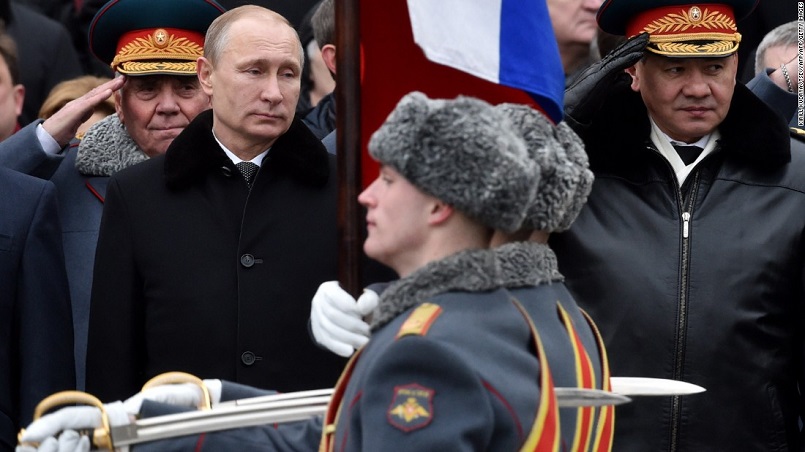
Leaders of Turkey and Israel find themselves inside the walls of the Kremlin in the next two days as President Vladimir Putin tries to entrench Russia's resurgent role in the Middle East.
Putin's interests hardly coincide with those of Turkish President Recep Tayyip Erdogan or Israeli Prime Minister Benjamin Netanyahu -- especially in Syria. But as the Trump Administration is yet to work out its Middle East policy, Russia has unprecedented leverage in the region.
Here's a very basic outline of each leader's priorities:
- Putin: consolidate Russia's leading role in Syria, preserve a delicate entente with Turkey in leading the Syrian "peace process" - and continue to try to coax it away from Europe and NATO as part of a broader strategy of weakening the western alliance.
- Netanyahu: persuade Russia to help reduce and minimize Iran's influence in Syria (and by extension Lebanon), underscore good personal rapport with Putin.
- Erdogan: promote Turkey's interests in Syria, if possible at the expense of the Kurds, and secure a role in the offensive against Raqqa. Put the US on notice that there are alternatives to American leadership in the region.
Turkey: on the losing side in Syria
Turkey has found itself on the losing side in Syria after backing rebel groups that have been hard hit by the regime's offensive. It has responded by launching an incursion across its border, helping rebel factions to expel ISIS from the town of al-Bab and occupying a large patch of northern Syria. But as much as taking on ISIS, the Turkish move was about preventing the Syrian Kurds from expanding their footprint.
That offensive has now brought Turkish-backed forces within touching distance of the Syrian army. At the very least, Turkey needs Russian help in preventing any clashes. It's also furious about Washington's ongoing support for the Syrian Kurds, who have proved to be the United States' most reliable partner in Syria against ISIS but who -- in Erdogan's view -- are a terrorist group closely tied to Kurdish militants in Turkey.
Last year, Turkish Foreign Minister Mevlut Çavuşoğlu said the US had "chosen a terrorist organization over its ally."
As he waits to see how the Trump administration's policies will evolve (so far there are no signs the US will abandon the Kurds in Syria), Erdogan will want to get a sense of Russian thinking as the battle to liberate Raqqa from ISIS nears. But after spending 18 months putting Assad back in control of much of Syria, Russia is not in the mood to make too many concessions -- for example on Turkey's longstanding desire to establish a safe zone in northern Syria.
There are limits to Erdogan's room for maneuver. Turkey is not going to leave NATO. "Turkey lives under the shadow of the Russian giant — its anger at the United States and its Western allies notwithstanding, it needs the protection the alliance offers," writes Henri J. Barkey, Director of the Middle East Program at the Woodrow Wilson International Center for Scholars, in Foreign Policy.
Even so, the rapprochement between Russia and Turkey has been remarkable. After the Turkish air force shot down a Russian jet over the border in November 2015, the Kremlin canceled commercial contracts and Russian tourism in Turkey.
The hard line worked. Erdogan eventually apologized for the incident, and was rewarded with a partnership in the Syrian "peace process". It was helped by growing hostility in governing circles toward the US, with some Turkish officials and commentators suggesting the CIA was behind last July's attempted coup. More recently there have been veiled threats to ban US forces from using Incirlik air base in southern Turkey, an important jumping-off point for attacks on ISIS.
Israel's sole concern: Iran
Israeli Prime Minister Benjamin Netanyahu's shopping list in Moscow includes just one item: Iran. Before leaving, Netanyahu said: "Iran is trying to establish itself permanently in Syria, with a military presence on the ground and at sea, and also a gradual attempt to open a front against us on the Golan Heights."
"The victory over Islamic State terror cannot lead to an increase in territory by Iran and its proxies. You don't replace terror with terror," he said later. Joining Netanyahu on the visit are four senior Israeli security officials.
But Russia is part of an alliance with Iran and the Syrian regime of Bashar al-Assad against rebel groups and their Gulf patrons. And relations between Moscow and Tehran are warmer than for decades.
It is a marriage of convenience whose vows were forged when the Assad regime was teetering in the summer of 2015. But those common interests go deeper. Both states oppose American dominance of the post Cold War order. Russia sees Iran as a promising market for its military hardware (especially post sanctions) and both are major players in the oil market.
But it's not a given that Iran would accede to Russian leadership in Syria. It has its own interests there -- part of a strategy to redraw the balance of power in the Middle East.
Still, Netanyahu knows he must deal with Putin -- he's been to Moscow three times in a year. The Russian leader is his best hope of preventing pro-Iranian militia from infiltrating border areas.
All in all, Moscow has become a hub of diplomatic activity as the tectonic plates of the Middle East shift and rumble.
